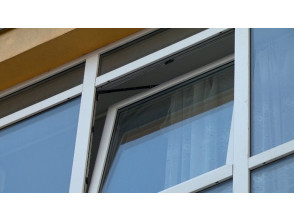Technology is being developed in Latvia that will allow the production of building windows that will help to keep rooms warm in the winter and cool in the summer, Latvian Television morning program “Rīta Panorāma” reported on January 30.
The chromatic materials for smart windows and zero-energy buildings developed by scientists from the ISSP UL’s Laboratory of Thin Films have been recognised by the Latvian Academy of Sciences (LAS) as one of the most significant achievements in Latvian science in the past year.
The material is a multi-layer coating that is thinner than the diameter of a human hair and is able to change its properties depending on external interaction, namely both temperature and lighting.
The leading researcher of the Laboratory of Thin Films, Māriņš Zubkins, explains that the new material, yttrium oxyhydride is a mixed anion material. The main characteristic of this material is that it changes its optical properties when it is illuminated with either blue or ultraviolet light. This property can be used in smart windows, as well as in optical sensors.
The thin multi-layer coating is made of cheap materials, so their implementation in industrial production in the future could be a relatively simple and cheap solution for the consumer. Mārtiņš Zubkins clarifies that on bright sunny days, the window will be tinted, so there will be no need to spend much energy on cooling. The window will trap infrared radiation. During the winter period, when the sun is not so bright, the windows will be transparent. This, of course, will save energy costs.
Head of the Laboratory of Thin Films, Juris Purāns, says that at the moment, researchers are at the stage when it is possible to develop windows that would have the effect of reducing thermal losses, the thermal flow through the window. For example, without smart windows, buildings may lose up to 30% of energy through windows.
Research in the development of thin films and windows at the ISSP UL is still ongoing. Latvia is home to one of the rare groups of scientists who develop such materials. The work results are very good, and the research has been published in high-level scientific journals. Juris Purāns believes that Latvia has the potential to develop thin film technology further.
The Institute has just received €2.4 million of European Union funding. The money will be used to fund a new laboratory and research team that will further develop such materials for windows.



